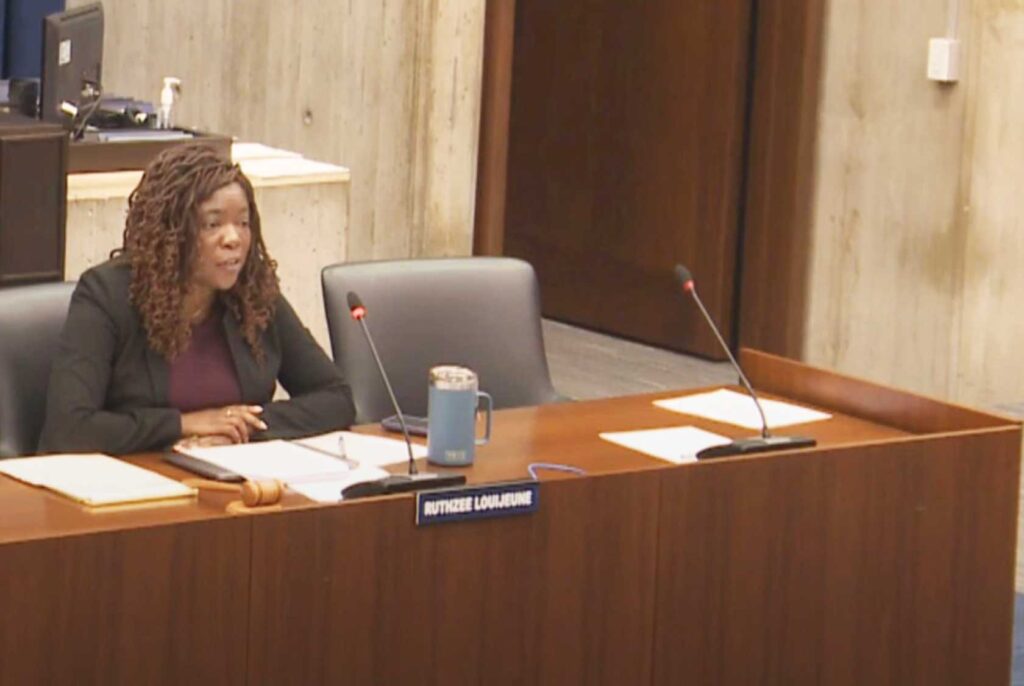Council probes lending discrimination
Black homeowners get lower appraisals

Despite federal laws, regulations and reporting requirements, and decades of efforts to combat the problem, racial discrimination in lending remains a persistent reality in 2023 — across the United States and here in Greater Boston.
Such were the conclusions of a panel of experts who spoke before a Boston City Council committee last week in a hearing aimed at determining not just whether and where such discrimination exists, but what the City of Boston can do about it.
In Boston, 44% of white households own their homes, compared to 31% of Black households and just 17% of Latino households, said Justin Steil, an associate professor of law and urban planning at MIT.
“This has broad effects on the inter-generational transfer of wealth, and also on other dimensions of health and well-being … It’s a crucial factor in racial inequality,” said Steil.
The reasons for the home ownership gap are myriad and complex and include everything from disparities in income and wealth to housing affordability and availability. But they also include discrimination, said Steil — not only in terms of who is able to get a mortgage, but what the rates and terms of that mortgage are.
“Black and Latino homeowners are paying more for the same access to credit,” said Steil.
And, Steil and other speakers noted, recent studies have shown racial disparities in how properties are assessed for the purpose of refinancing and borrowing against one’s home. A 2021 study by Freddie Mac found that homeowners of color were more likely than whites to see their homes under-valued in appraisals.
There is also wide racial disparity among lending institutions in terms of who is getting loans and from what kinds of lenders, said Thomas Callahan, executive director of Partnership for Financial Equity.
An upcoming report by Callahan’s organization found that in 2021, one bank made only 7% of its mortgage loans to homebuyers of color, versus another lender’s roughly 47%.
Speaking with the Banner, Callahan said the upcoming report reflects what years of such annual reports before it have already confirmed: “These reports over the years have showed racial disparities in who get the loans.”
And there are racial disparities in the kinds of mortgages being offered or marketed. Several committee panelists said that Black and brown residents are more often being steered toward less favorable mortgage products than their white counterparts, an example being Federal Housing Administration (FHA) loans, which tend to be more expensive than other mortgage programs, like the city’s “ONE+ Boston” program, in which city funds are utilized to lower first-time homebuyers’ ultimate interest rate.
As to what Boston and cities like it can do about the problem, panelists offered several ideas.
One answer may lie in a little-known and largely dormant city ordinance, known as the “linked deposit ordinance,” which aims to leverage the city’s ability to negotiate with banks, known as city depositories, that do business with the city and that hold billions of city dollars in deposits.
The ordinance has been on the books since 1999 — but has gone largely unenforced and under-utilized, said Robert Terrell, the newly-appointed executive director of the city’s Office of Fair Housing and Equity.
While the ordinance requires banks to report lending practices, those reports have been sporadic; and while the ordinance created a commission to review bank lending practices, “I haven’t seen any evidence that they are meeting or that they have been called together as a group,” said Terrell.
He added, “We need to reactivate that commission. We should be using the leverage we have to get some of the reforms we want in the banking industry … The city of Boston is not a bank regulator, but we have some tools I think we should use more and more aggressively.”
Another answer Terrell and other advocates put forward is a return to the kind of “paired tests” used for decades to prove discriminatory practices by lenders.
In one such test conducted by the Fair Housing Study Center of Greater Boston in 2006, 40 people in 20 pairs — one white person and one person of color – fanned out across Greater Boston to test whether banks and mortgage offices would offer each member of the pair the same treatment.
They didn’t.
The study found “difference in treatment that disadvantaged home-buyers of color” in nine out of 20 cases, with seven cases being egregious enough to form a basis for legal action.
Jim Campen, a professor emeritus at U-Mass Boston and a former board president of the Fair Housing Study Center, said such testing is “the gold standard method for documenting discrimination.”
“I encourage your committee, the City Council in general, to advocate for additional paired testing,” Campen said.
Hillary Pizer, of the Massachusetts Affordable Housing Alliance, agrees that Boston and other cities should resume such testing — but she cautions that simply addressing existing discrimination isn’t enough to correct the wrongs of decades of discriminatory practices and structural racial inequities.
“In addition to the need for testing is the need for resources — private-public partnerships to try to reverse the home-ownership gap that’s built over generations.” Pizer told the Banner.
Pizer points to programs like Boston’s ONE+ and STASH programs, which help offset the cost of a mortgage for first-time home-buyers.
The question of resources was not lost upon Housing and Community Development Committee Vice-Chair Ruthzee Louijeune, who noted that the Council “is about to enter budget season … and so we’re going to be talking about that in the budget.”
Louijeune said she will push for the city to ramp up its efforts to pressure banks to put a stop to discriminatory practices, including utilizing the “linked deposit ordinance” and paired testing.
“We have a tremendous opportunity,” Louijeune said, “And I think this is a moment for us to lean in.”






